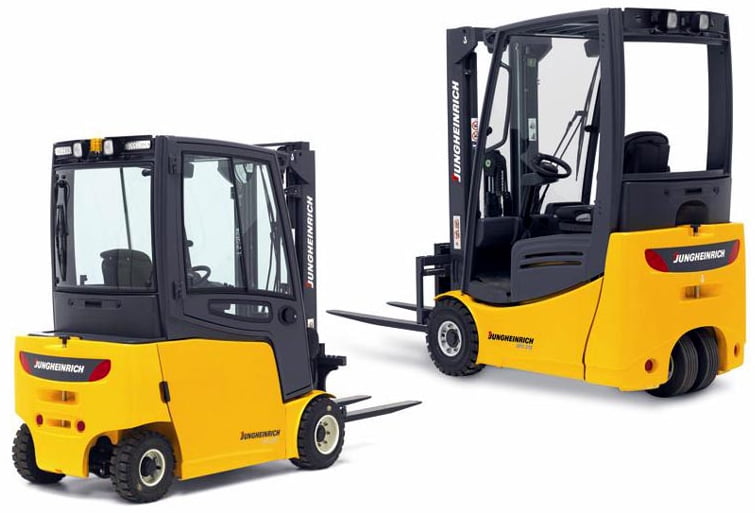Chapter 5: Voltage Levels Used in Electric Lift trucks Today
Electric warehousing lift trucks are based on a range of voltages (e.g. 24V, 36V, 48V and 80V). Some applications don’t require a great deal of power. For example, most Class III lift trucks (walkies, walkie-stackers and walkie end-riders) operate on 24V power, considered a low voltage. Smaller lift trucks like these often (although not always) only have to transport lighter loads, have limited hydraulic functions requiring lower amperage and work in areas where top speeds are not important. With a relatively low voltage and lower amperage, power output is low. On the other hand, a higher voltage in a truck’s electrical system means the ability to achieve higher levels of performance. For example, an 80V system, as opposed to, say, a 36V system, permits higher levels of acceleration and torque.
In general, any current flow entails some heat radiating from conductors. Thus, the low current of a higher voltage system means relatively lower heat losses. In a lift truck, the single biggest enemy of energy efficient operation is buildup of heat that cannot be dissipated quickly. Heat buildup not only harms electronic components, it also creates greater electrical resistance in wiring and cables, making it more difficult for a battery to push current through the conductors – as the electrical resistance has been increased. A rising heat level in conductors means a greater current draw is needed to compensate for this increased resistance, which in turn creates even more heat.
Read The Full Series:
Chapter 1: The Concept of Total Cost of Ownership (TCO)
Chapter 2: AC Technology Compared to Internal Combustion
Chapter 3: Compressed Natural Gas (CNG)
Chapter 4: Trends in Materials Handling
Chapter 5: Voltage Levels Used in Electric Lift trucks Today
Chapter 6: Battery and Charging Systems
Chapter 7: Electric Braking and Energy Regeneration
Chapter 8: Emissions and Corporate Responsibility: A Major Problem for IC Lift Trucks
HCO Innovations is publishing this eight-part series as an in-depth comparative analysis and discussion on Compressed Natural Gas (CNG) Internal Combustion (IC) motors and Alternating Current (AC) Eletric lift truck engines, Comparison Analysis of CNG (IC) vs. AC Electric Lift Trucks, by Will Van Ness, VP of Fleet Management at HCO Innovations.
Comparison Analysis of CNG (IC) vs. AC Electric Lift Trucks (AC)
The materials handling industry continues to evolve at a rapid pace, particularly in the area of motive power propulsion. Tremendous technological advancements have been made over the past decade to directly address the rising cost of petrol (fossil fuels) along with stricter emission standards. Today’s MHE acquirers have more choices than ever when it comes to motive power propulsion and with the success seen amongst fleets utilizing alternative fuel sources such as lithium ion (LION) and Hydrogen Fuel Cell (HFC), the choices will most likely increase as time goes on. For the purpose of this discussion document, our focus will be on comparing AC Electric (AC) to Internal Combustion powered lift trucks (IC), specifically compressed natural gas (CNG).

